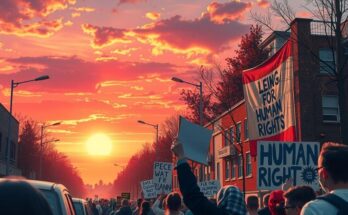Support for Yoon Amid Controversy
Despite facing significant backlash, the National Human Rights Commission of Korea (NHRCK) continues to back President Yoon Suk Yeol in light of his controversial martial law declaration on December 3-4, 2024. Reports suggest the agency has reiterated some of Yoon’s self-justifications, which has raised eyebrows among its staff and the public alike.
Measures for Military Commanders
In a recent meeting, the NHRCK deliberated on protective measures for four military commanders currently accused of insurrection. This meeting, convened following a formal request from former Defence Minister Kim Yong-hyun, was prompted by concerns regarding the rights of the military personnel involved. As reported by agency officials, the NHRCK is also considering the human rights of Kim Yong-hyun, reflecting the complexity of the situation.
Legal Defence for Yoon
As reported by the NHRCK, the constitutional provisions must be strictly adhered to during Yoon’s trials, underscoring the necessity of protecting his right to legal defence. They argue that detaining him without sufficient cause during the ongoing criminal investigations would contradict the Criminal Procedure Act. However, the Seoul Western District Court recently issued an arrest warrant, citing fears of evidence tampering.
Internal Discontent
The NHRCK’s recent actions have drawn criticism from several of its own officials, with some 50 staff members publicly voicing opposition. They decried a resolution cementing Yoon’s rights as a misstep, reflecting dissatisfaction within the agency about its current direction. Reports indicate that a faction within the NHRCK, believed to be supportive of Yoon, has led these controversial recommendations despite significant internal dissent.
Contested Justification for Martial Law
According to the NHRCK, consideration of Yoon’s arguments posits that his martial law declaration was a governance act, thus limiting parliamentary oversight. However, the watchdog emphasised that while Yoon’s rights to defence are important, the legitimacy of the parliamentary actions cannot be dismissed as an abuse of power. The need for a balanced view on civil rights amid political turmoil has never been clearer.
Call for Equality
Lawyer Kim Yong-jik, voicing concerns at the NHRCK, argued that protecting Yoon’s human rights was unwarranted given his access to legal representation, bringing to light issues of equality. He pointed out the erratic nature of prioritising the president’s rights while neglecting the repercussions of his martial law declaration. Ultimately, the internal debate highlights the tension between political allegiance and the mandate of human rights advocacy.
NHRCK supports Yoon despite controversy over martial law. The agency is considering protective measures for military commanders on trial and emphasises the need to uphold Yoon’s legal defence rights. Internal division grows as staff express dissatisfaction with protective measures for the president, highlighting tensions between political allegiance and human rights advocacy.
The NHRCK’s ongoing support for President Yoon amid controversy surrounding his martial law has ignited significant internal conflict within the agency. By deliberating on the rights of military commanders and emphasizing legal protections for Yoon, the NHRCK walks a precarious line, intertwining political dynamics with human rights principles. This situation underscores the challenges faced by human rights bodies in politically charged environments.
Original Source: www.koreaherald.com



